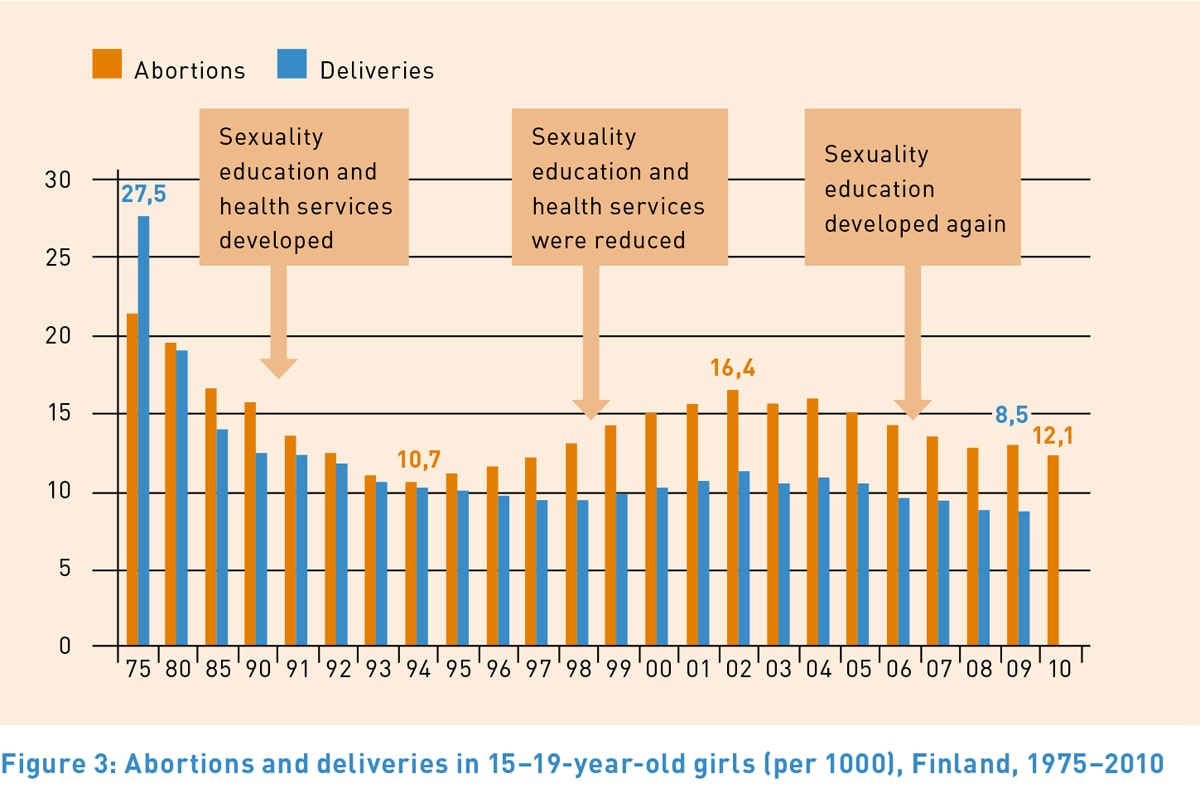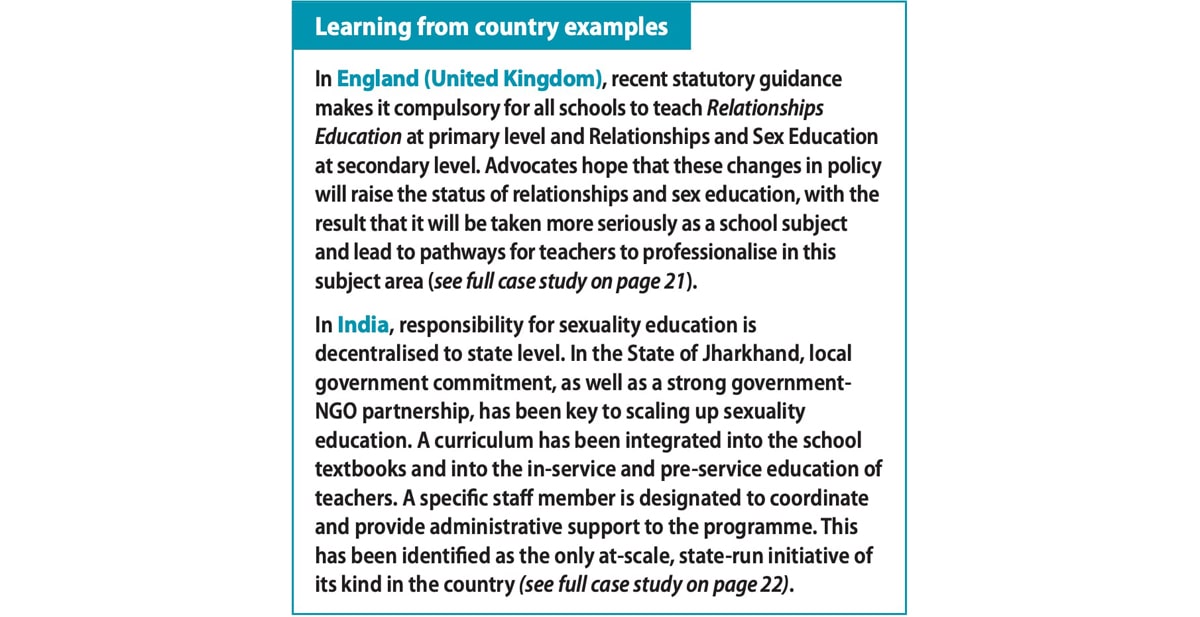壹、全面性教育
五、全面性教育在其他國家的實踐情形
Global Review of Comprehensive Sexuality Education
歐洲國家在 20 世紀中葉起,開始在學校內推動性教育,如瑞典在 1955 年起將性教育列為必修課,德國在 1968 年,奧地利、荷蘭、瑞士等國也都在 1970 年代推動性教育,而英國、法國及葡萄牙、西班牙等,也在 1990-2010 年間施行。中東歐國家則在共產主義政權瓦解後,才開始發展性教育課程,此前,僅有「為了婚姻與家庭準備」的教育內容,否定了年輕人的婚前的情感與性關係。29WHO Regional Office for Europe and BZgA, Standards for Sexuality Education in Europe: A Framework for Policy Makers, Education and Health Authorities and Specialists, Köln: BZgA, 2010. Evert Ketting, Minou Friele, Kristien Michielsen and On behalf of the European Expert Group on Sexuality Education, Evaluation of Holistic Sexuality Education: A European Expert Group Consensus Agreement, The European Journal of Contraception & Reproductive Health Care 21: 1 (2016/1/2), pp. 68–80. UNESCO, UNAIDS, UNFPA, UNICEF, UNWomen and WHO, International technical guidance on sexuality education: an evidence-informed approach. 2nd rev. ed., Paris: UNESCO, 2018. BZgA, Comprehensive Sexuality Education Factsheet Series, Factsheet Series, Cologne: BZgA, 2020.
以荷蘭為例,小學一年級(4 歲)的學生已開始接受「關係與性」的全面性教育課程,並且,每年舉辦「春季狂熱週」活動,全國各地的小學生及家長自願參加。後續調查發現,這樣的課程提升了學生的性溝通技巧、增加有關性暴力和性騷擾的知識以及改善對同性戀的態度。30Sanderijn van der Doef, The Dutch Approach: starting as young as possible, BZgA Forum: Sexuality Education and Family Planning, 2011.
許多歐洲國家也紛紛推出自己的性教育計劃。其中,愛沙尼亞和芬蘭的經驗更是清楚地展現出,性教育可以有效增加避孕藥物或保險套的使用,並減少非預期懷孕和性傳染病的傳播。31Dan Apter, Recent developments and consequences of sexuality education in Finland, BZgA FORUM Sexuality Education and Family Planning, 2011. Kai Haldre, Kai Part and Evert Ketting, Youth Sexual Health Improvement in Estonia, 1990–2009: The Role of Sexuality Education and Youth-Friendly Services, The European Journal of Contraception & Reproductive Health Care 17: 5 (2012/10), pp. 351–62.
芬蘭於 1990 年實施性教育計劃後,非預期懷孕率顯著下降;1998 年刪減該計畫後,非預期懷孕率則顯著上升。8 年後,芬蘭再次在全國範圍內實施性教育,非預期懷孕和人工流產率都下降了,年輕人發生首次性行為的時間點也較為延後。芬蘭在這 20 年間的政策變化與相關數據,證實了以學校為本(School-Based)的性教育的重要性。32Dan Apter, Recent developments and consequences of sexuality education in Finland, BZgA FORUM Sexuality Education and Family Planning, 2011. BZgA, UNFPA and WHO Regional Office for Europe, Sexuality Education: Policy Brief 2. Sexuality education: What is its impact?, Cologne: BZgA, 2015.
 圖片來源:Dan Apter, Recent developments and consequences of sexuality education in Finland, BZgA FORUM Sexuality Education and Family Planning, 2011. BZgA, UNFPA and WHO Regional Office for Europe, Sexuality Education: Policy Brief 2. Sexuality education: What is its impact?, Cologne: BZgA, 2015.
圖片來源:Dan Apter, Recent developments and consequences of sexuality education in Finland, BZgA FORUM Sexuality Education and Family Planning, 2011. BZgA, UNFPA and WHO Regional Office for Europe, Sexuality Education: Policy Brief 2. Sexuality education: What is its impact?, Cologne: BZgA, 2015.
2021 年,聯合國教科文組織發布了以全球為範圍所調查的學校全面性教育狀況報告。該報告反映了全面性教育的整體進展、挑戰、挫折和需要改進的領域,並進一步強調正確實施全面性教育的重要性和有效性。
最近取得的成果則包括 2006 年至 2019 年間在印度施行全面性教育計畫,如印度賈坎德邦超過 100 萬名學生受惠;而尚比亞的示範性教師培訓模式,支持國家規定全面性教育課程;芬蘭則進一步實施全國 0-6 歲兒童的全面性教育計劃。報告中還強調了全面性教育的各種不同方法和途徑,以展現各國得以依照各自的經濟、政治和文化狀況,發展不同的教育規劃。最後,它為加強世界各地全面性教育相關政策和規劃的前進方向提供了指引。33UNESCO, UNICEF, UNAIDS, UNFPA, WHO and UNWomen, The journey towards comprehensive sexuality education: global status report, Paris: UNESCO, 2021.
 圖片來源:UNESCO, UNICEF, UNAIDS, UNFPA, WHO and UNWomen, The journey towards comprehensive sexuality education: global status report, Paris: UNESCO, 2021.
圖片來源:UNESCO, UNICEF, UNAIDS, UNFPA, WHO and UNWomen, The journey towards comprehensive sexuality education: global status report, Paris: UNESCO, 2021.
在許多國家,全面性教育因遭受誤解,導致無法順利地推進。接下來,我們將摘錄並簡要說明《綱要》對於全面性教育迷思的回應。

